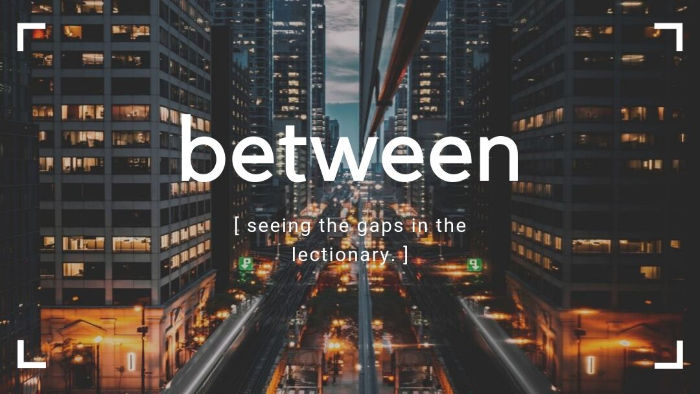A look at the gaps in the lectionary.
This week: the gap between Proper 5A and 6A
The text: Matthew 9:27-34
This week, the lectionary skips over a couple of healing stories. The first involves two men who are blind and the second involves a man who is mute.
We can see why the lectionary skips over them. They don’t seem to contribute all that much to the narrative. Or, at least, not to the narrative the creators of the lectionary think we’re interested in.
But here’s the problem of addition by subtraction.
The lectionary has skipped over a whole bunch of healing stories. Which means we, if we’re only reading the lectionary, have no clue just how much we are missing.
As I described last week, the shift from the Sermon on the Mount to a whole chapter of healings is deeply significant to the whole story. And now, we’re jumping, not to healings, but to confrontations and teachings.
Do we really understand how much of Jesus’s ministry was healing people and not making sure they all have the right doctrine? And, further to the point, when we get to chapter ten for this week, are we prepared to see this as our ministry, too?
A Present Challenge For Us
As I write this, we’ve just learned of Pat Robertson’s death. Robertson was the famous TV pastor of the 700 Club and also a famous bigot.
Much of his ministry involved healing through financial giving to the church and demonizing LGBTQ+ persons. And his style of faith really does seem to be focused on protecting the “right” doctrine more than it does on healing. Much like the discredited conversion therapy does no actual healing of gay people.
His death reveals, not merely the challenge of embracing these truths: of Christ and his mission of healing and restoration: but also in maintaining our own values.
It is hard for many good people to not celebrate his death or rejoice in his suffering. In other words, succumb to our own base urges and be the one we ourselves reject.
The experience, of both dealing with Robertson’s theology and his death, is as revealing of our own humanity as it does his.
For he is not the source of evil. He’s just a human in desperate need of healing.
Back To the Stories
There are very interesting wrinkles to these two stories.
The First
Two blind men come to Jesus together. They shout (the familiar) “Have mercy on us, Son of David!” offering an uncommon knowledge.
Jesus’s response to them is to ask about belief, tying their presence in that moment and in the future to the idea of belief. A concept which ought to evoke the second week of Easter (have you believed because you have seen?)
Then Jesus warns them to say nothing to anyone: and, of course, they don’t listen.
The Second
This isn’t a healing, but an exorcism. A demoniac (a word we associate with the one in the cemetery with a Legion of demons) has possession of a man, leaving him mute.
Jesus sends the demon away, the man speaks, and all is well.
Then it says that the crowds were amazed at this, saying “Never has anything like this been seen in Israel.” Which seems like hyperbole to us. This is the crazy thing? He just raised a girl from the dead, but this is the amazing feat?
Apparently?
But here, it seems as a statement in deep contrast with the one the Pharisees say right after: that this is proof that he is possessed. An argument we probably process as an excuse. But this is, perhaps, too dismissive of their belief and concern. Just because they are biased, that doesn’t mean we ignore them. It means that we should ignore bad arguments.
Next
This is what precedes the moment when Jesus sees the crowd is harassed and helpless. And, I think, it informs it.
Jesus approaches them knowing how people have been treated. Why so many have come to him for healing. Why he is quite literally the only one who is willing to hear them, let alone heal them.
And because of that, it brings to mind all the people with medical maladies that are ignored by professionals. And all of those suffering with pain or grief or mental illness — only to be ignored, rejected, or despised by people tasked to help them.
And, because it is June, the natural connection to the suffering of LGBTQ+ persons is most present to mind.
This is why the healings, their context, and the wider impact of reading them all, is worth our time.
